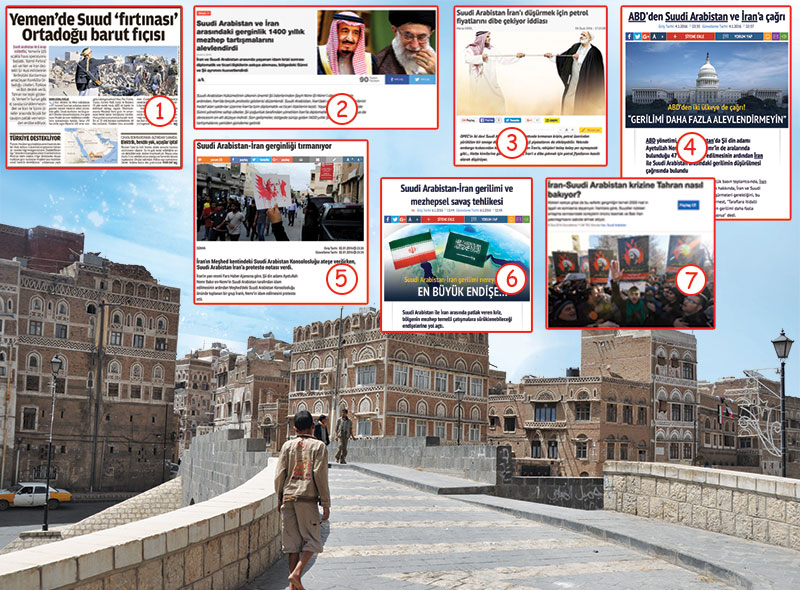Is This the Will of Yemenis or the Global Powers?
The coalition forces composed of air forces of ten nations under the leadership of Saudi Arabia have started the long expected operation against the Houthi Ansar Allah movement upon the call of Yemeni President Abd Rabbuh Mansour Hadi. With the beginning of the air operation known as "Decisive Storm", eyes have once more turned to Yemen.
This operation started with the air bombardment of the Yemeni capital Sana'a, under the control of the Houthis, during the night on March 26th. The air forces of Kuwait, Jordan, United Arab Emirates, Qatar, Bahrain, Sudan and Morocco have joined the operation to which Saudi Arabia participated with 100 jets. Egypt and Pakistan also gave support to the operation.
It has been reported that tens of civilians have lost their lives during the air operation to which the US also gave logistics and intelligence support. The images of people who have died, injured and those in extreme grief in the region are constantly being broadcasted in the media. In order to understand properly what is happening in Yemen, one needs to have a good grasp of the situation, not only of the country itself, but of the region in general.
 |
The appearance and development of the Houthi movement in Yemen
Yemen, with a very strong and influential tribal system, is one of those Arabic societies in which tribal tides are strongest. Because of the weakness of the central government, tribes are in the driver seat in many regions. Houthis, the target of this operation, are one of those influential tribes.
Houthis are a branch of about 400 Zaidi Shia tribes that constitute 30% of the whole Yemeni population and have been educated by the Shia missioners since the 80's. The Houthi movement was started in 1992 by Zaidi Shia university students backed by Iran and was organized under the name of "Young Muslims." After the US insurgency in Iraq in 2004, the movement enjoyed wide support in the Yemeni capital Sana'a with the rising anti U.S and anti Israel incentives.
Hussein Badreddin al-Houthi, the leader of the movement who started an armed uprising in 2004, had been killed on September 10th 2004, along with 20 followers and was replaced by his son Abdul Malik al-Houthi who received military and religious education in Iran.
During this time, Ali Abdullah Saleh who has been the President of Yemen since 1990 was in office. Abdullah Saleh was regarded as an ally by the US. Despite the serious discomfort of the citizens, Saleh remained in the office with corruption, oppression and politic intrigues and enjoyed serious support of the US.
The Process Leading to the Operation
In the wake of the uprisings in Yemen, which were the reflections of the Arab Spring in 2011, Ali Abdullah Saleh resigned from the office after being given immunity. Vice President Mansour Hadi, supported by the Obama administration, succeeded him. In this way the pro-US regime had been protected in Yemen.
Iran backed the Houthi uprising that started in September 2014, it escalated when the Shia militia seized power in Sana'a. President Mansour Hadi, who was put under house arrest after this uprising, fled to Aden in the south of the country and declared that he resumed his post as the President. The UN Security Council did not recognize the Houthi government and declared that Mansour Hadi government is the official Yemeni government.
Just before the operation, Houthis besieged Aden after seizing the city of Lahij, 60 km to Aden and Aned, the greatest air base in the south of the country. That was the last straw that broke the camel's back.
It is not possible to say that Houthis enjoy a wide public support however they have about 100-120 thousand closely organized people at their root and about twenty to thirty thousand armed forces.
 |
| 1. Saudi "storm" in Yemen. Middle East is like a powder keg - Daily Zaman, 27.03.2015 |
| A democratic assembly in which Sunnis and Shias are justly represented and a national reconciliation government will be an important step in attaining peace and stability in Yemen. |
Is the Yemen Operation a reflection of Saudi-Iran Conflict?
The visible justification for the operation is the Saudi Arabian support together with the allies to the legal Yemeni government against the dissident Houthis. Saudi Arabia is thus planning to blockade the Houthi structuring that is a threat in their southern border. However there are many other dynamics leading to this current state.
The most important one of those dynamics is that Yemen is the focal point in the traditional Iran-Saudi conflict. Iran who increased involvement in the Middle East affairs by reinforcing support to the Shia formations in Iraq and to the Al-Assad regime is also urging to reinforce its hand in Yemen by means of the Houthis they have equipped and organized behind the curtains for decades.
As a matter of fact, in one of his statements, the Iranian Chief of Staff defined Sana'a as the fourth capital city under the influence of Iran. As is known Yemen is a country with direct access to the Red Sea and the Aden Gulf and has a great strategic importance. In this way Tehran is planning to gain the upper hand by besieging its main competitor Saudi Arabia.
Of course Saudi Arabia, which regards this development as a grave threat against its own country and regime, could not remain as mere spectator and acted with its allies, the other Arabic Gulf countries.
As is seen, the backstage of the ongoing conflicts in the ethnic-sectarian-tribal triangle in Yemen is surrounded with great actors like Saudi Arabia and Iran. Behind these actors of course there are global forces like US, Russia, China that are very closely interested in the balances in the region. While the US, the Saudi ally, supports the operation fiercely, Russia and China, the allies of Iran, want to end the operation immediately.
A New Front Opened for the Further Massacre of Muslims
The only perceptible point that the intricate dynamics and processes mentioned above lead to is nothing other than Muslims, be them Shia or Sunni, being dragged into new disasters.
Ever since the beginning of the operation tens, maybe hundreds of innocent Muslim civilians have lost their lives and their possessions. It is an acknowledged fact that majority of civilian losses are not included in the official figures and that the real losses are always more than what is announced.
Ethnical, sectarian or tribal-focused conflicts give no result other than dragging the Islamic world into still deeper pains and disasters, rendering them weak and playing into the hands of those deep forces instigating these dissensions.
One of the most crucial points is to put an end to such operations, which would serve no other purpose than shedding Muslims' blood as soon as possible and to resort to a democratic solution in which reconciliation, dialogue, unity and peace will prevail throughout the country. In addition to that, a democratic assembly in which Sunnis and Shias are justly represented and a national reconciliation government will be an important step in attaining peace and stability in the country.
- Introduction
- Two Countries Geographically Far Apart But Very Close in Heart and Soul: Yemen and Turkey
- Yemen, But What Sort of Yemen?
- The Problem of Poverty in Yemen and Regeneration
- How To Ensure the National Unity of Yemen?
- How Can Yemen Best Make Use of Its Natural Wealth?
- Women's Place in Yemeni Society
- The Lowest Common Denominators the Parties in Yemen Can Agree on
- The Importance of Individual Rights and Freedoms in Yemen
- Terror Is Again at the Top of Yemen's Agenda
- The Corruption Eating Away at Yemen from the Inside
- One of the Dozens of Problems Facing Yemen Is Immigration
- Key to Democracy and Development in Yemen: Education
- Countries Swamped by Debt and Interest
- Political Life in Yemen
- Why Is Military Spending Significant?
- Houthis Are the Brothers of All Yemenis
- Yemen Must Not Fall into the Trap of Identity Politics
- The Protests in Yemen Should Not Turn into a Mass Frenzy
- Mindsets Need To Change for A Permanent Peace in Yemen
- What Can Be Done To Ensure Stability in Yemen?
- Will the New Government in Yemen Bring Stability?
- Yemen Doesn't Deserve To Be A Failed Country
- The Problems of Yemen Can Be Solved When A Strong National Security Is Built
- Military Operations Do Not Always Produce A Solution
- Political Instability in Yemen Is Having a Damaging Effect on Children
- Spirit of Unity a Must for Yemen's Political Transition
- What Yemen Needs Is a Spirit of Union and Unity
- Yemenis Must Be Friends, Not Enemies
- There Is Still Hope for Peace and Democracy
- The Struggle for Power Must Not Break Yemen Apart
- Yemen Must Not Become a Trojan Horse on the Arabian Peninsula
- Developments in Bahrain, Yemen and Other Islamic Countries Must Not Be Allowed To Turn into A Sectarian Conflict
- Operation Decisive Storm Brings Not Stability But Death to Yemen
- Turkey Asks for Peace in Yemen, Not War
- Deaths Cannot Stop More People Being Killed
- Yemen Needs Urgent Ceasefire
- What Is Happening in Yemen Is No Longer a Political, but a Humanitarian Crisis
- An International Model To Put an End to the Conflict in the Islamic World Is Possible
- A Lack of Quality Is Feeding the Conflicts in the Islamic World
- Yemen: A Country That Nobody Sees and Nobody Hears
- The Only Solution to the Tragedy in Yemen: The Reconstruction of Peace and Love
- Conclusion
